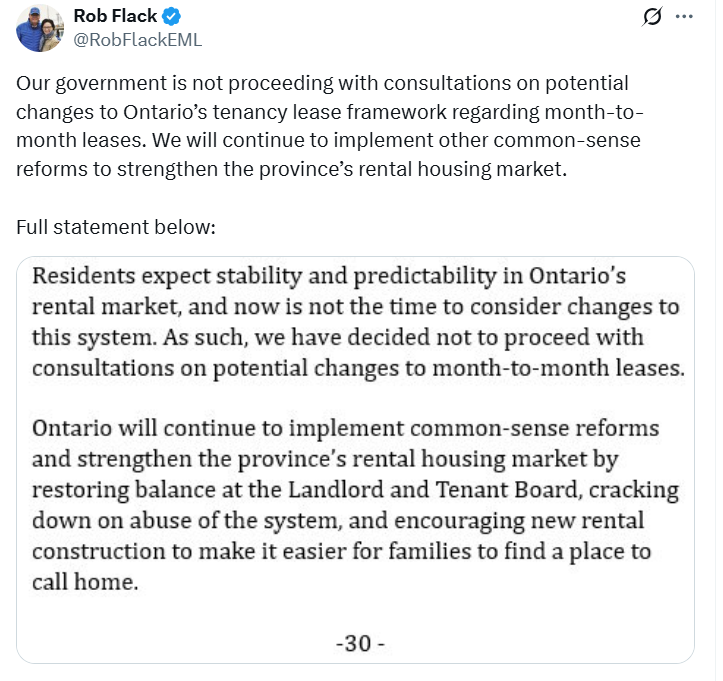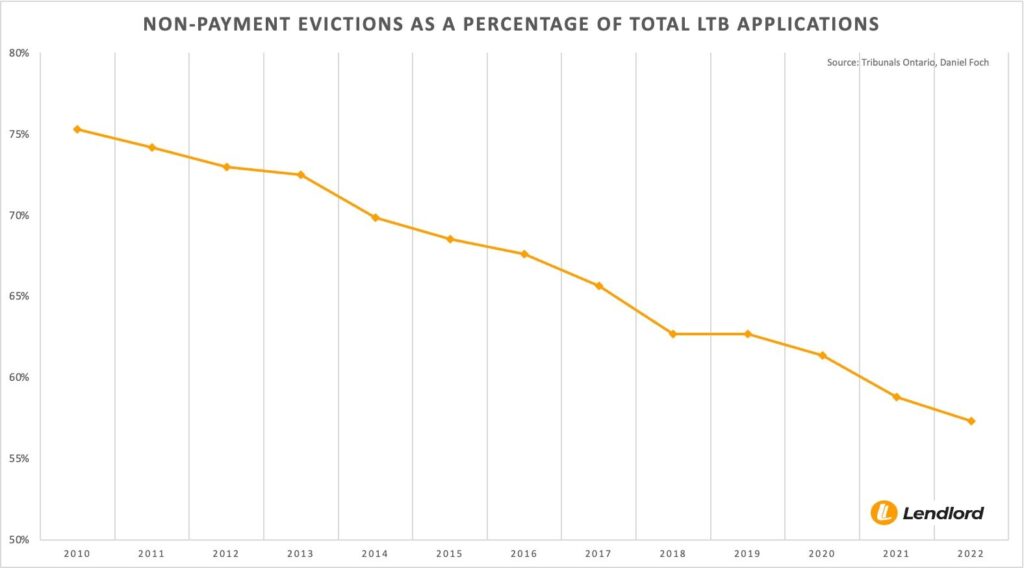The Doug Ford government’s reversal highlights how tenant protections remain untouchable in Ontario Rent Control, making it vital to understand how the system actually works.
Table of Contents
Rent control in Ontario has long been one of the most politically charged elements of the housing system, shaping the fortunes of tenants, landlords, and investors alike. In late October, Premier Doug Ford’s government ignited controversy by signalling a review of “security of tenure,” the rule that ensures leases automatically continue after their first year. Within days, faced with mounting public backlash, the government abandoned the idea.
The reversal was more than a momentary retreat. It underscored how central rent control has become to Ontario’s housing politics and how fragile the balance between tenant protections and investor confidence truly is. For renters, the backtrack was a relief. For landlords, it was another reminder of the risks created by a broken Landlord and Tenant Board. For policymakers, it was proof that touching rent control is political quicksand.
This article explains how rent control in Ontario works, why Ford’s attempted change collapsed so quickly, and what the episode reveals about the future of housing policy in the province.
What Rent Control Means in Ontario
Rent control in Ontario regulates how much landlords can increase rents each year. The system is anchored in security of tenure, which guarantees that once a one-year lease expires, it automatically converts to a month-to-month arrangement. Tenants retain the right to stay in their homes indefinitely, provided they respect the lease and the Residential Tenancies Act. Landlords may only terminate for specific reasons such as sale of the property, personal use, or major renovations.
Without this safeguard, landlords could reset rents to market each year, effectively stripping tenants of protection. This is why the government’s proposed “review” was understood not as a technical consultation, but as an existential threat to rent control itself.
Doug Ford’s Policy Reversal
The proposal appeared in the Fighting Delays, Building Faster Act, a wide-ranging housing bill with more than forty regulatory changes. It suggested consultations on alternatives to security of tenure, ostensibly to give landlords more flexibility at lease expiry.
Tenant groups and housing advocates quickly interpreted it as a move toward eliminating rent control. Media coverage amplified those concerns, protests followed, and the political backlash was immediate. By the weekend, Housing Minister Rob Flack announced that consultations would not proceed, affirming that residents expect “stability and predictability” in Ontario’s rental market.

The speed of the reversal illustrates the raw political sensitivity of tenant protections. Even the suggestion of change was enough to dominate headlines and overshadow other parts of the bill.
Why New Buildings Are Exempt from Rent Control
A common misconception is that rent control discourages new construction. In fact, Ontario’s rules exempt all units built after November 2018 from rent control. Developers of new rental housing are free to set and adjust rents as they see fit, while older buildings remain capped by the province’s annual guideline.
This split system means tenants in older units enjoy stability, while investors in new stock retain flexibility. The effect is not on the quantity of new supply, but often on its quality. Landlords with rent-controlled units are less inclined to invest in upgrades, knowing they cannot recover the costs through higher rents.
The Broken Landlord and Tenant Board
Behind Ford’s flirtation with reform lies the dysfunction of the Ontario Landlord and Tenant Board (LTB). The backlog has surpassed 50,000 cases. Landlords can wait six to eight months to evict a tenant who has stopped paying rent. Tenants face similar delays when challenging illegal evictions or requesting repairs.
The government doubled the number of adjudicators, yet wait times grew worse. Critics argue that political interference in appointments exacerbated the problem, but the deeper issue is institutional inefficiency. Both landlords and tenants now agree the system is broken.
Evictions and Non-Payment of Rent Trends
The data show that disputes have become more complex than simple non-payment. In 2010, three-quarters of all LTB applications were for unpaid rent. By 2022, that share had fallen to 57 percent. More recent data suggest the figure has risen again to 64 percent, but still below its historic peak.

This trend reflects growing tension over repairs, maintenance, and eviction practices. Weak enforcement means cases linger, undermining confidence on both sides of the rental relationship.
Ontario’s Housing Construction Slowdown
While rent control dominated the headlines, Ontario’s larger crisis is a faltering construction pipeline. Rising costs, high financing rates, and regulatory delays have already throttled new housing starts. Once today’s high-rise projects conclude, many in the construction trades will struggle to find work.
Housing is one of the province’s most important economic engines, and its slowdown threatens broader growth. The Fighting Delays, Building Faster Act contains reforms designed to accelerate approvals and incentivise purpose-built rental supply, yet those measures were eclipsed by the uproar over rent control.
What Rent Control Means for Renters, Landlords, and Investors
For renters, the Ford government’s retreat ensures security of tenure remains intact. For landlords, the ordeal underscores how dependent their cash flows are on the speed of a dysfunctional tribunal. For investors, the lesson is that policy risk is as significant as interest rate or market risk.
In recent years, Ontario investors have been buffeted by foreign buyer bans, Airbnb restrictions, and municipal licensing regimes. A single ministerial statement can reshape investment math overnight. Ford’s backtrack is another reminder that housing policy is unpredictable and politically charged.
Where Housing Policy Goes From Here
Large, sweeping reforms are unlikely to survive in Ontario’s renter-heavy political environment. Expect more surgical measures instead:
- Fixing the Landlord and Tenant Board.
- Incentives for purpose-built rental housing.
- Faster approvals for new projects.
- Possible restructuring of development charges to improve project feasibility.
These are the reforms that could expand supply without provoking political chaos. Ford’s government has learned that Ontario can build faster, but it cannot bulldoze tenant rights in the process.
Conclusion
The attempt to revisit security of tenure was short-lived, but it revealed a deeper truth about Ontario’s housing politics. Tenant protections are now a political red line, defended not just in law but in the court of public opinion. The real crisis is elsewhere: a tribunal that cannot deliver justice in time, a construction sector that is slowing to a crawl, and a supply deficit that grows with every passing year.
Ontario’s future depends on balancing tenant stability with the expansion of new housing supply. Rent control is not going away. The question is whether the province can restore fairness and efficiency to its institutions while reigniting the economic engine of construction. Anything less will leave Canada’s largest housing market mired in dysfunction.
Ontario’s rental market is evolving quickly, and the rules can be difficult to navigate.
Whether you are a renter seeking stability, a landlord managing risk, or an investor planning your next move, informed guidance is essential.
Chat with Valery (bottom right corner) to gain clear insights and strategies shaped by data and grounded in expertise.
Frequently Asked Questions (FAQs)
Q1. Is there rent control in Ontario?
Yes. Ontario continues to have rent control in 2025. Rent increases are capped by the provincial guideline each year, and tenants benefit from security of tenure, which means their lease automatically continues after the first year unless specific conditions are met.
Q2. How does rent control work in Ontario?
Ontario rent control limits how much landlords can raise the rent each year for most rental units built before November 2018. The increase in amount is set by the government and usually tied to inflation. After the first lease term, tenants automatically move to a month-to-month arrangement and can only be asked to leave for specific legal reasons.
Q3. Why are new buildings exempt from rent control in Ontario?
Units first occupied after November 15, 2018 are exempt from rent control. The exemption was designed to encourage developers to build more rental housing by giving them flexibility to set and adjust rents in new buildings. Older properties remain under rent control.
Q4. Does Ontario have rent control on condos?
Yes, if the condo unit was first occupied before November 15, 2018, it is subject to rent control. Newer condo units first occupied after that date are exempt. Tenants in both cases retain security of tenure, meaning their lease continues month-to-month after the first year.
Q5. What is the maximum rent increase allowed in Ontario in 2025?
The provincial government sets an annual rent increase guideline. For 2025, the cap is 2.5%. Landlords cannot raise rents above this amount unless they receive special approval for extraordinary expenses.
Q6. Can a landlord evict a tenant in Ontario without cause?
No. Ontario law requires that landlords have a legal reason to evict, such as selling the property, moving in themselves, or undertaking major renovations. Tenants who pay rent and follow the lease cannot be evicted simply because the landlord wants to reset the rent.
ABOUT THE AUTHOR

Daniel Foch is the Chief Real Estate Officer at Valery, and Host of Canada’s #1 real estate podcast. As co-founder of The Habistat, the onboard data science platform for TRREB & Proptx, he has helped the real estate industry to become more transparent, using real-time housing market data to inform decision making for key stakeholders.
Daniel is a trusted voice in the Canadian real estate market, regularly contributing to media outlets such as The Wall Street Journal, CBC, Bloomberg, The Globe & Mail, Storeys and Real Estate Magazine (REM). His expertise and balanced insights have garnered a dedicated audience of over 100,000 real estate investors across multiple social media platforms, where he shares primary research and market analysis.
